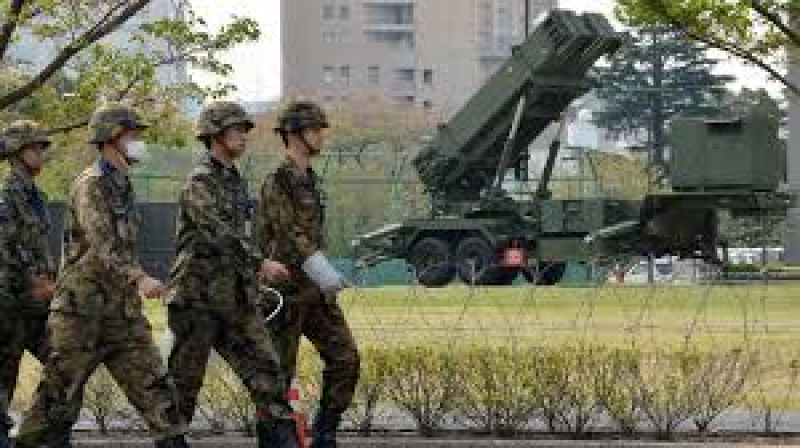- Power transfer, start of new journey for democracy: Prof Yunus |
- NCP Leaders Sign July National Charter in Dhaka |
- Tarique Rahman Vacates Bogura-6 Seat After Dual Win |
- Newly Elected MPs, Cabinet Members to Take Oath Tomorrow |
- India beats Pakistan by 61 runs as World Cup scenario heats up |
Japan to send Patriot missiles to US which may aid Ukraine

Japan says it will send Patriot air defence missiles to the US after changing its arms export rules, in a shift away from its pacifist policies.
The White House has welcomed the move, which could free up the US to send its own stockpile to Ukraine.
Western powers have been running out of ammunition to supply Ukraine in its defence against Russia's invasion.
Patriot missiles are among the most advanced weapons supplied by the US to Ukraine.
Tokyo previously only allowed for components of licensed equipment to be sent from Japan to the nation where the manufacturing licence originated. But under the new rules it can ship finished goods too.
Shortly after the government announced this change on Friday, the foreign ministry said it would ship Patriot missiles to the US to "further strengthen the Japan-US alliance".
It added that the missiles could only be sent to the US, and would require Japan's approval to be sent to a third country. Japan still bans the export of weapons to countries at war.
This could mean that Japan-made Patriot missiles may replenish the US' stockpile, while Washington sends US-made ones to Ukraine.
In Japan, the Patriot missiles are manufactured by Mitsubishi Heavy Industries under licence from US defence contractors Lockheed Martin and RTX.
It comes after the US government reportedly requested Japan to change its defence export rules. It is the first time Tokyo has done so since 2014.
Earlier this month, the US Congress failed to approve a $60bn aid package for Ukraine despite a plea from President Volodymyr Zelensky.
Ukraine has warned that it is already being forced to downsize some military operations because of a drop-off in foreign aid. It has been asking the US for more air defence support for months.
Tokyo is also considering exporting 155mm artillery shells to the UK as it makes them under licence from London-based BAE Systems, according to the Financial Times.
Japan's National Security Council is expected to decide what equipment to provide to which country on a case-by-case basis.
The change in rules happens as Japan wrangles with its long-standing pacifist stance.
After World War Two, Japan adopted a constitution which prohibits the country from going to war except in cases of self-defence. The constitution does not officially recognise the military and limits it to self-defence capabilities.
It also imposed an arms export ban, which was in 2014 eased for the first time in almost 50 years under then-Prime Minister Shinzo Abe - a move that was viewed with suspicion in China.
Last year, Japan announced that it would double its military spending to 2% of the country's GDP by 2027, citing threats posed by China and North Korea.
Beijing's increasing military aggression has fuelled Japanese anxiety that should conflict break out in Taiwan, Japan would not only be pulled into a war between the US and China, but also targeted as a US ally. It hosts US military bases and has the biggest concentration of troops outside America.
North Korea also poses a perennial existential threat to Tokyo, as its nuclear ambitions have grown more alarming - with a record number of missile launches this year, including several that have flown over Japan, reports BBC.

